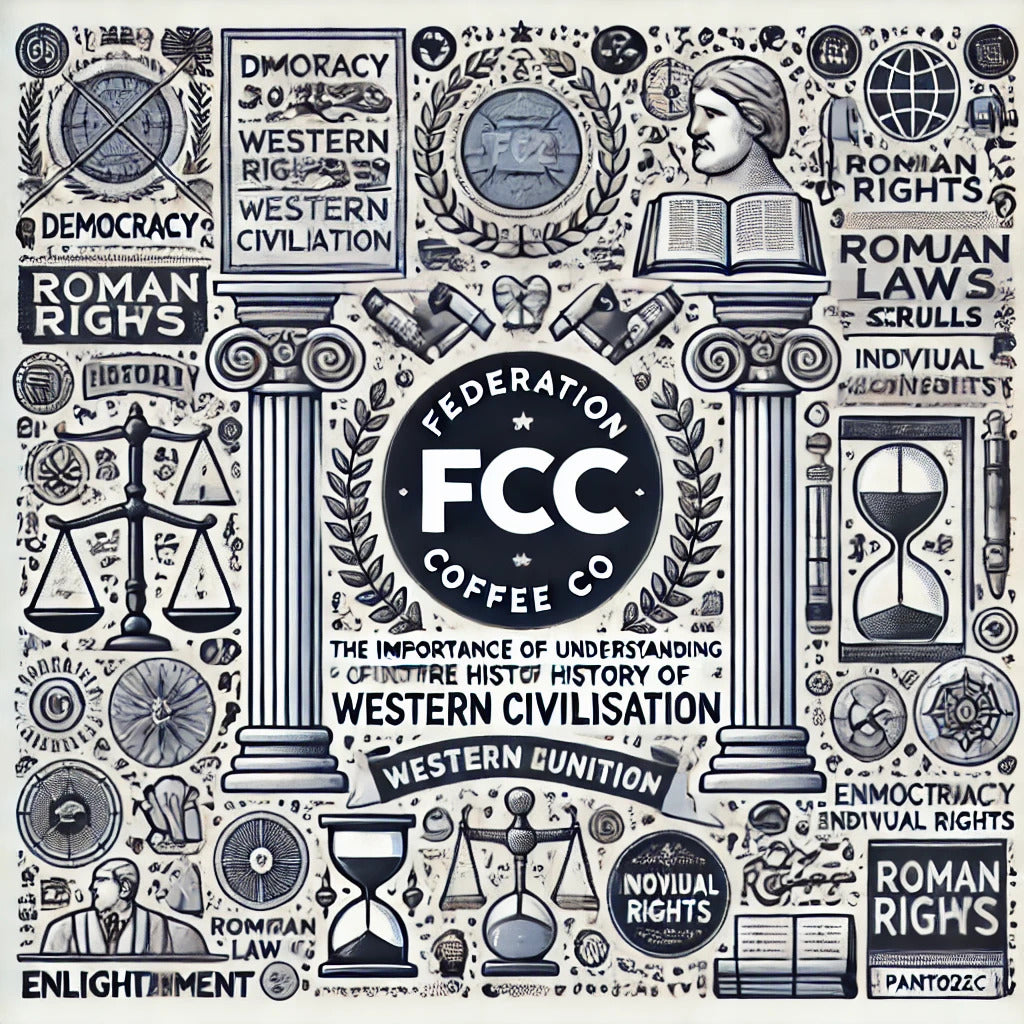Introduction
At Federation Coffee Co, our mission is to unite Australians through a shared understanding and appreciation of our collective heritage. Understanding the history of Western Civilisation is more than an academic exercise; it’s essential for any citizen seeking to comprehend the development of modern society. Western Civilisation has shaped the legal, political, and economic frameworks that govern much of the world today. By exploring its history, we gain insights into the philosophies, achievements, and challenges that have defined our culture and institutions. This knowledge helps us recognise the values and principles that underlie our way of life, fostering a more informed and engaged citizenry.
Here are ten key reasons why understanding the history of Western Civilisation is crucial:
1. Contextualising Modern Institutions
Historical Foundations: Many modern political and economic institutions have roots in Western Civilisation. For instance, democratic principles can be traced back to ancient Greece, while the rule of law has its origins in Roman law.
Current Relevance: Understanding these origins helps citizens appreciate the evolution and current functioning of these institutions, fostering a deeper respect and commitment to democratic governance and legal systems.
2. Learning from Historical Successes and Failures
Economic Systems: The development of capitalism, for example, can be traced from medieval trade practices, through the Industrial Revolution, to contemporary market economies. Learning about these stages helps citizens understand the strengths and weaknesses of current economic systems.
Political Systems: Historical events like the Enlightenment and revolutions (e.g., the American and French Revolutions) significantly shaped modern political thought. Understanding these events helps citizens recognise the value of principles like liberty, equality, and justice.
3. Appreciating Cultural and Intellectual Heritage
Philosophical Influences: Western Civilisation has produced a rich tapestry of philosophical thought, from Aristotle and Plato to Locke and Rousseau. These thinkers have shaped ideas about governance, rights, and societal organisation that underpin modern political systems.
Scientific and Technological Progress: The Scientific Revolution and the Enlightenment fostered a spirit of inquiry and innovation that continues to drive technological and economic advancements today.
4. Understanding Socioeconomic Inequalities and Struggles
Colonialism and Imperialism: Western Civilisation’s history includes periods of colonialism and imperialism that have left lasting impacts on global socioeconomic inequalities. Understanding this history is essential for addressing contemporary issues of inequality and promoting global justice.
Labour Movements and Social Reforms: The history of labour movements and social reforms in Western countries provides valuable lessons on how collective action and policy changes can address economic and social injustices.
5. Informed Citizenship and Participation
Critical Thinking: Historical knowledge fosters critical thinking, enabling citizens to analyse current events and policies in a broader context. This helps in making informed decisions and participating meaningfully in democratic processes.
Civic Responsibility: Understanding the historical struggles for rights and freedoms instils a sense of civic responsibility and the importance of safeguarding these achievements for future generations.
6. Valuing the Rule of Law and Individual Rights
Legal Foundations: The legal traditions of Western Civilisation emphasise the rule of law, individual rights, and accountability—principles that protect citizens and uphold justice. Knowledge of these foundations fosters respect for legal systems and rights protections that define democratic societies.
Freedom and Autonomy: By understanding the philosophical roots of individual freedom, such as those promoted during the Enlightenment, citizens are reminded of the importance of preserving personal liberties against authoritarianism.
7. Inspiring Innovation and Adaptability
Legacy of Innovation: Western Civilisation’s history of scientific, artistic, and technological achievements demonstrates the power of creativity and inquiry. Recognising this legacy encourages modern societies to continue fostering innovation and progress.
Adaptability: Western Civilisation has repeatedly adapted in response to challenges—from the fall of Rome to the Renaissance, to modern technological revolutions. This adaptability is a model for addressing today’s complex challenges, from climate change to globalisation.
8. Building Moral and Ethical Foundations
Ethical Philosophy: Western Civilisation has contributed significantly to moral and ethical philosophy, from Aristotle’s virtue ethics to Kant’s deontological principles. Understanding these ideas provides a framework for ethical reasoning and moral decision-making.
Human Rights: The concept of universal human rights is deeply rooted in Western thought, particularly from Enlightenment ideals. Recognising this history reinforces the importance of protecting human rights and dignity worldwide.
9. Fostering Cultural Appreciation and Diversity
Global Exchange: Western Civilisation has a long history of exchange with other cultures through trade, exploration, and intellectual exchange. This has led to a blending of cultural practices and ideas, contributing to a richer, more diverse global society.
Diverse Perspectives: Understanding Western Civilisation’s interaction with other cultures allows for a deeper appreciation of diversity and a better grasp of multiculturalism, encouraging respect and empathy for different cultural backgrounds.
10. Strengthening Community and Social Responsibility
Social Cohesion: Western Civilisation has fostered various models of community and civil society, from Greek city-states to modern civic organisations. These models highlight the importance of social cohesion and the role of communities in building stable societies.
Responsibility to Others: Many philosophical and religious traditions within Western Civilisation, such as Christianity’s emphasis on charity and compassion, reinforce the importance of caring for others and supporting the common good.
Conclusion
Federation Coffee Co believes that a shared understanding of our history unites us as Australians. By learning from the history of Western Civilisation, we equip ourselves with the knowledge needed to critically assess and engage with the political, economic, and cultural systems that shape our lives. This historical perspective fosters informed and active participation in democratic processes, an appreciation of cultural and intellectual heritage, and a respect for principles like individual rights and innovation. By embracing both the achievements and lessons of the past, we build a stronger, more resilient society—one that values justice, equality, and continuous progress towards a sustainable future.

